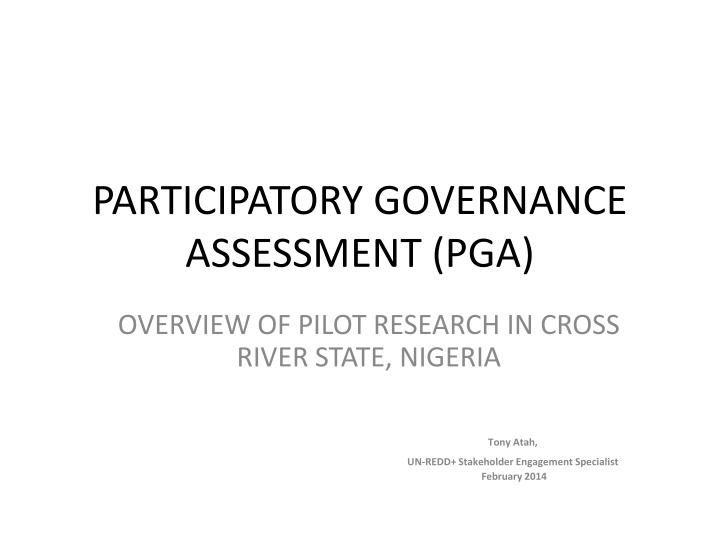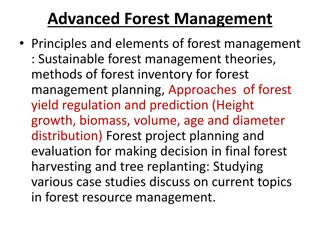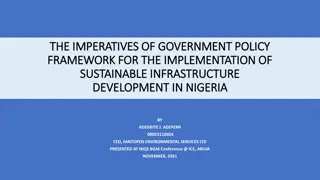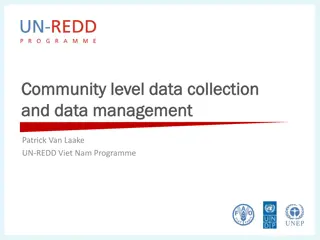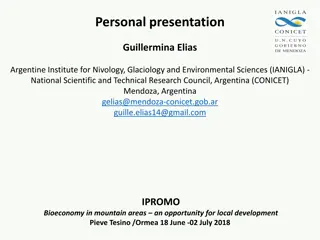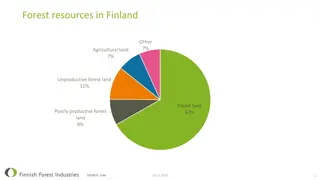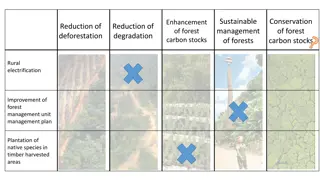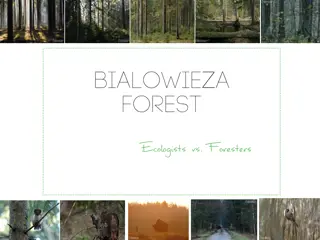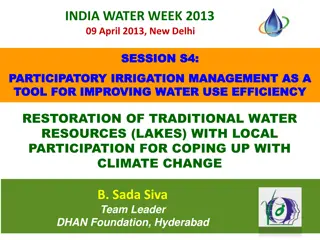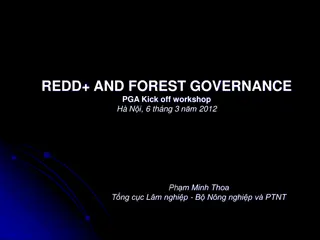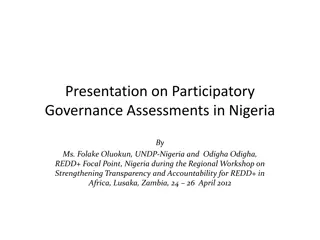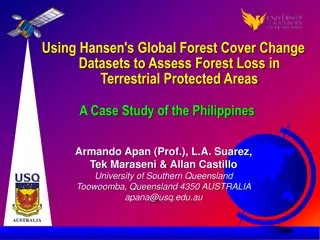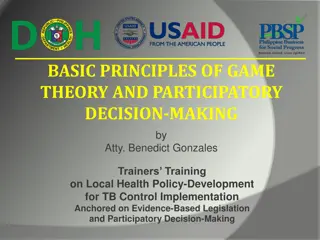Enhancing Participatory Governance for Sustainable Forest Management in Cross River State, Nigeria
This overview outlines the objectives, principles, geographic coverage, and technical aspects of the Participatory Governance Assessment (PGA) pilot research conducted in Cross River State, Nigeria in 2014. The PGA aimed to evaluate legal instruments, institutional capacity, community participation, benefit distribution, and anti-corruption strategies related to REDD+ implementation and forest governance. Key findings highlighted governance risks such as lack of fiduciary systems, ineffective feedback mechanisms, and challenges in information accessibility and dissemination.
Download Presentation

Please find below an Image/Link to download the presentation.
The content on the website is provided AS IS for your information and personal use only. It may not be sold, licensed, or shared on other websites without obtaining consent from the author.If you encounter any issues during the download, it is possible that the publisher has removed the file from their server.
You are allowed to download the files provided on this website for personal or commercial use, subject to the condition that they are used lawfully. All files are the property of their respective owners.
The content on the website is provided AS IS for your information and personal use only. It may not be sold, licensed, or shared on other websites without obtaining consent from the author.
E N D
Presentation Transcript
PARTICIPATORY GOVERNANCE ASSESSMENT (PGA) OVERVIEW OF PILOT RESEARCH IN CROSS RIVER STATE, NIGERIA Tony Atah, UN-REDD+ Stakeholder Engagement Specialist February 2014
Nigeria PGA Objectives To assess existing legal instruments for effective REDD+ implementation and forest governance; institutional capacity of government agencies to implement the REDD+ Programme and sustainable forest management policies; existence and effectiveness specifically designed for REDD+; existence and effectiveness of mechanisms established for meaningful participation by forest-dependent communities in the implementation of REDD+; existence and implementation of the benefit distribution system for REDD+ in terms of its transparency and fairness in distribution of benefits to the concerned stakeholders. of an anti-corruption strategy
Principles of PGA PGA is based on four vital principles of Accountability; Participation; Transparency; and legitimacy.
Geographic coverage of preliminary PGA in Nigeria The preliminary PGA exercise was conducted in three pilot communities of Esuk Mba in Akpabuyo Local Government Area (LGA); Iko Esai in Akamkpa LGA; and Baunchor in Boki LGA.
Technical coverage of preliminary PGA Looked at governance issues across the different sub-themes of stakeholders perceived gains and losses, governance risks, private sector drivers of deforestation and communication system.
Focus on Governance Risks Absence of fiduciary and fund management systems at the local community level; No clearly defined responsive feedback and grievance mechanisms; Accessibility of information & active dissemination amongst stakeholders affected by - Inadequate knowledge of type of information available; inadequate means of dissemination; timeliness of message delivery; and appropriateness of language used.
Focus on Governance Risks (continued) Active participation of all stakeholders, including vulnerable groups affected by - ineffective engagement of stakeholders; and Stakeholders limited capacity to participate effectively. poor stakeholders identification and engagement; and inadequate empowerment especially information sharing to encourage participation. unmanaged expectations and inconsistent engagement of communities leading to loss of interest and confidence.
Focus on Governance Risks (continued) Inter-agency coordination Rule of law, access to justice & effective remedies Rights of local communities to land & to carbon Gender equality & women s empowerment: Free, prior & informed consent by local communities Involuntary resettlements Traditional knowledge & cultural heritage Equitable & transparent benefit sharing Economic & social well-being of all, including vulnerable groups
Recommendations More data on governance issues for implementing REDD+ required; Stakeholder participation should be encouraged in the PGA process; Awareness raising/advocacy on PGA & REDD+ critical for stakeholder buy-in; Develop and implement effective information and communication strategy; Stakeholders input is needed to verify the PGA data collected; Promote learning through review of findings from the preliminary PGA; Identify opportunities for addressing poverty through pro-conservation livelihoods initiatives; Issues regarding funds management should be addressed promptly; Strengthen institutions and enforcement systems at all levels; Reflect gender considerations and equity as part of safeguards against governance risk. Sustain/improve relevant policies to implementing REDD+ and improving forest governance.
Conclusion Addressing governance issues is the bedrock for - effective implementation of the UN-REDD+ program; and sustainable forest governance in general. Taking into consideration, among several others the following:
Thus ensuring that the REDD+ programme complies with standards of democratic governance , and carefully assesses potential adverse impacts on stakeholders long-term livelihoods and mitigate effects where appropriate.
